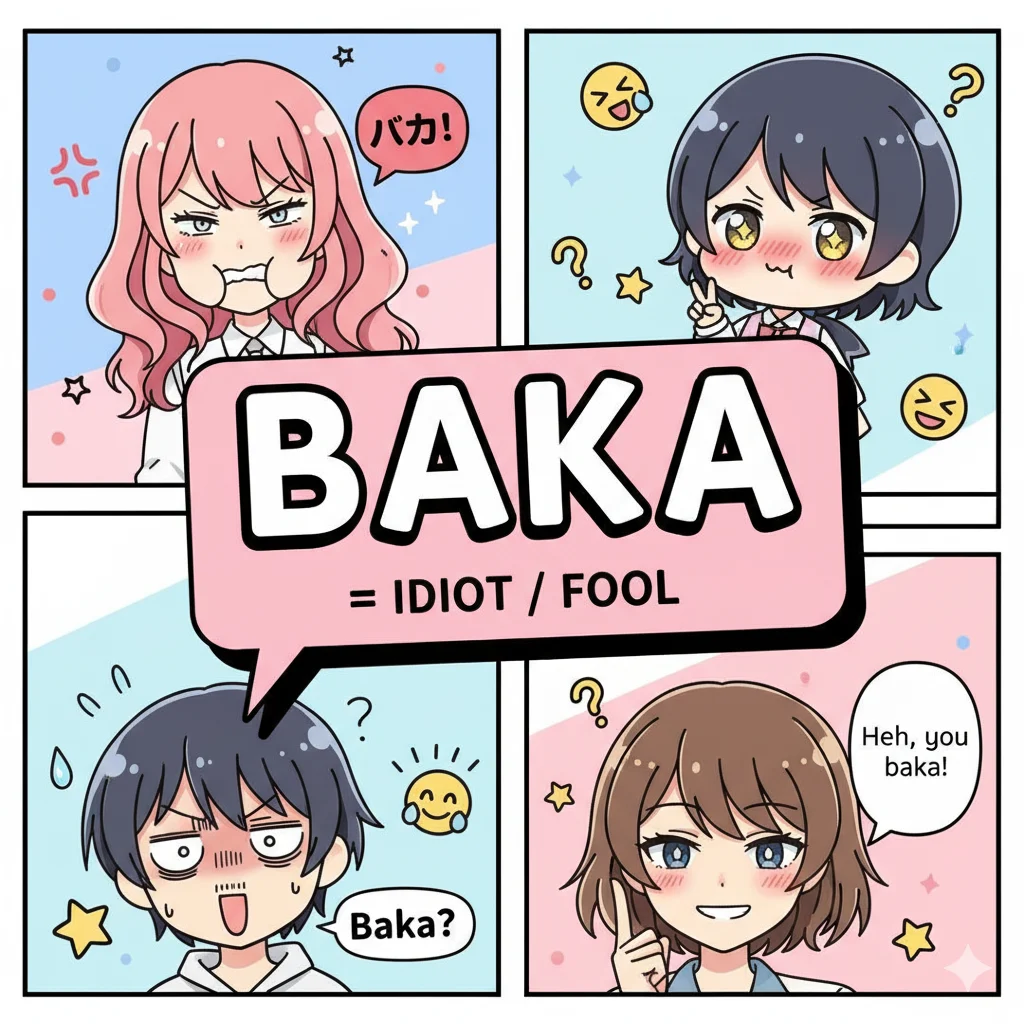“Baka” is a Japanese word that means “idiot,” “fool,” or “stupid,” and it’s widely used in anime, manga, gaming, and Japanese culture.
Depending on tone and context, it can be playful, teasing, insulting, or even affectionate.
This guide breaks down the meaning of baka, its origins, pronunciations, usage in anime and Japanese conversations, emotional tones, examples, variations like bakana and bakayaro, common misunderstandings, cultural impact, and more.
Understanding the Meaning of “Baka”
The Japanese word baka (ばか / バカ) is one of the most commonly heard expressions in anime and Japanese pop culture.
At its core, “baka” translates to:
- Idiot
- Fool
- Stupid
- Silly
- Nonsense
- Ridiculous person
But unlike the English word “idiot,” baka has many layers. Sometimes it’s harsh, other times it’s gentle or joking. The meaning changes with tone, context, relationship, and situation.
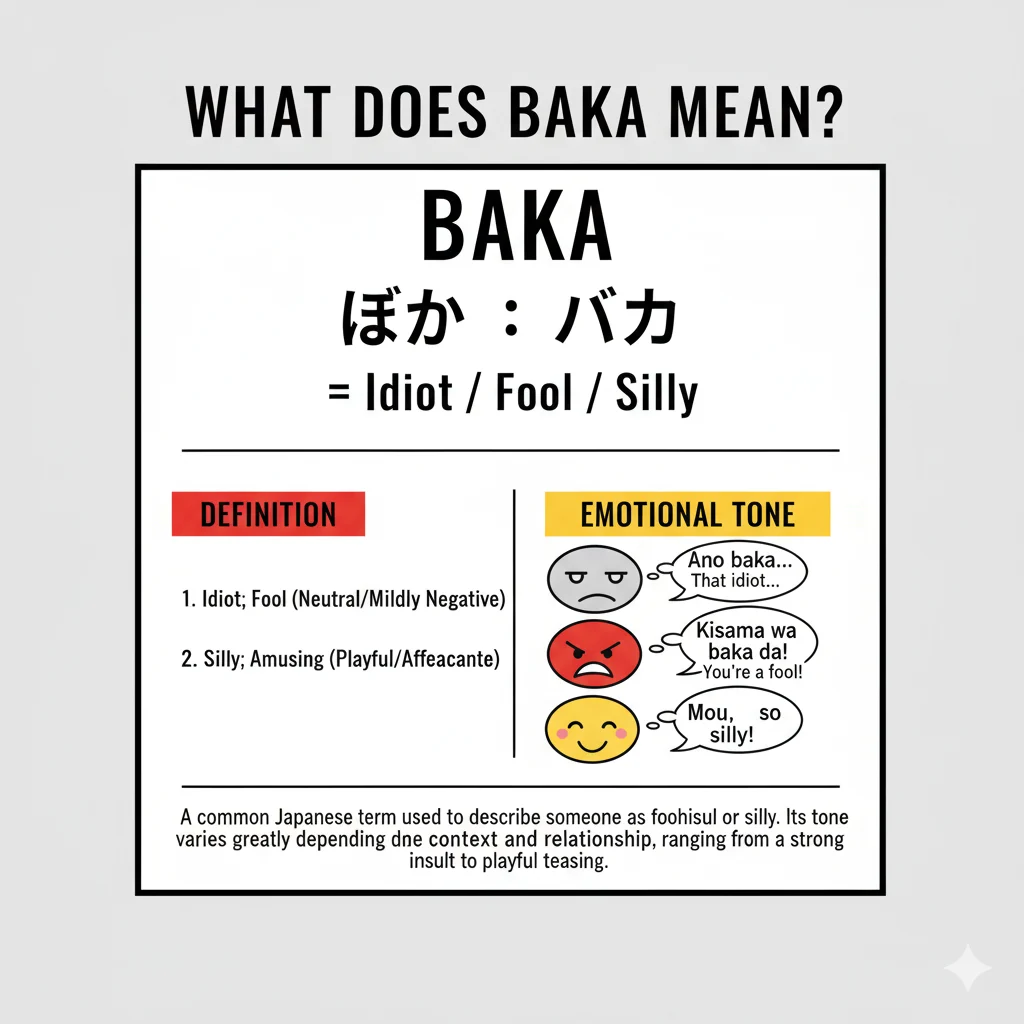
Why “Baka” Sounds Different in Anime
Anime often uses exaggerated expressions. So when a character shouts “BAKAAA!” it can range from:
- Angry frustration
- Comic reaction
- Embarrassment
- Romantic fluster
- A mix of all three
In real Japanese conversations, the intensity is usually more subtle.
Origins & Linguistic Background of “Baka”
The origin of “baka” is surprisingly complex.
Theory 1: Derived from “Horseless Deer”
One ancient Chinese origin traces “baka” to “馬鹿”, meaning horse-deer.
It came from a story where a high-ranking official intentionally misidentified a deer as a horse to test loyalty. Those who agreed were called “baka” — meaning foolish or easily manipulated.
Theory 2: From Sanskrit “Moha” or “Vyaka”
Some scholars suggest a Buddhist connection:
- Moha (delusion)
- Vyaka (confusion)
These terms evolved into Japanese religious vocabulary and eventually into common slang.
Theory 3: Edo-period Humor
In the Edo era, comedians used baka in plays and satire to mock foolish behaviour.
Regardless of the exact origin, the word grew into a universal slang expression in Japan.
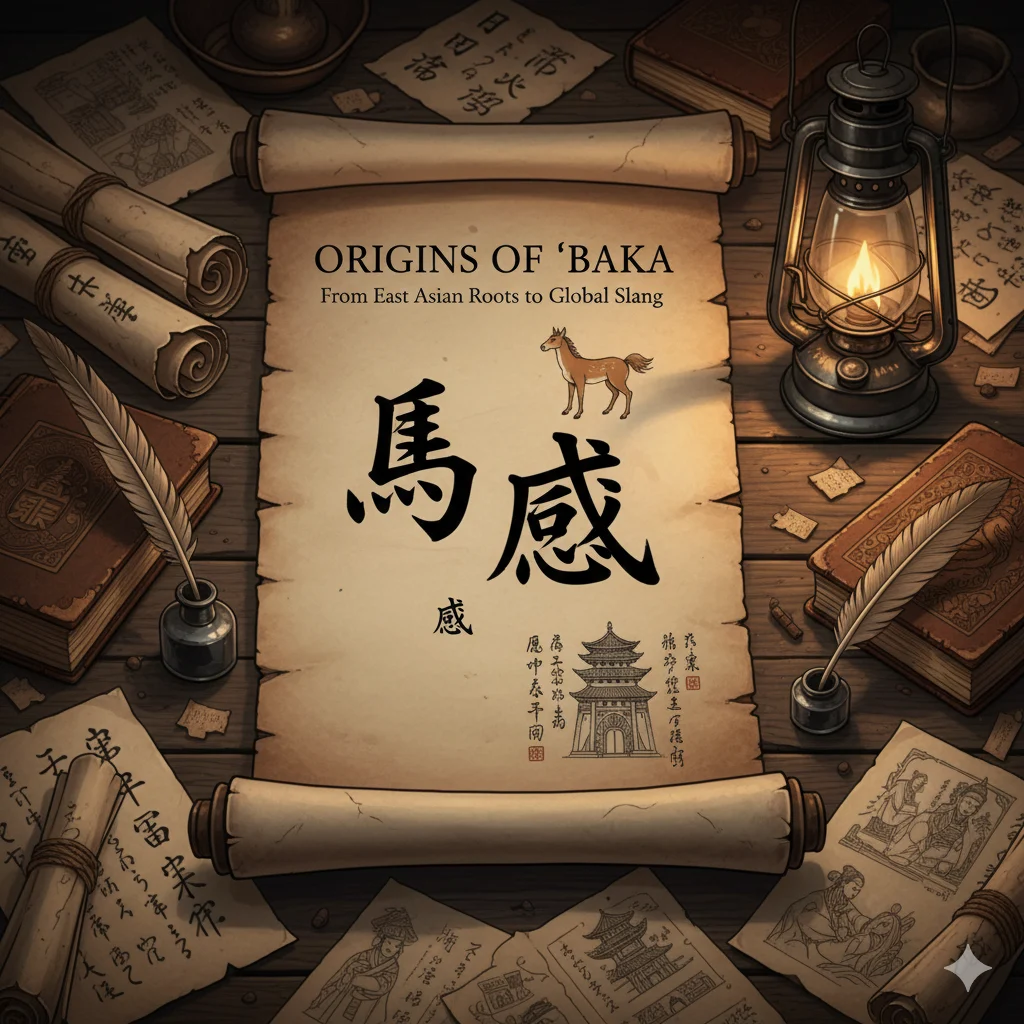
How “Baka” Is Used in Japanese Conversation
In real life, baka is used differently depending on the relationship.
Casual Teasing
Among friends:
- “Baka!” = “You dummy!” (playful)
Used when someone jokes around or does something silly.
Romantic Usage
- “Baka…” softly
This implies: - Shy affection
- Embarrassment
- Soft scolding
Common in anime — known as tsundere moments.
Serious Insult
In a heated argument:
- “BAKA!” = major insult
Equivalent to calling someone stupid in English.
Self-Expression
People say:
- “Ore wa baka da” → “I’m such an idiot”
To express personal frustration.
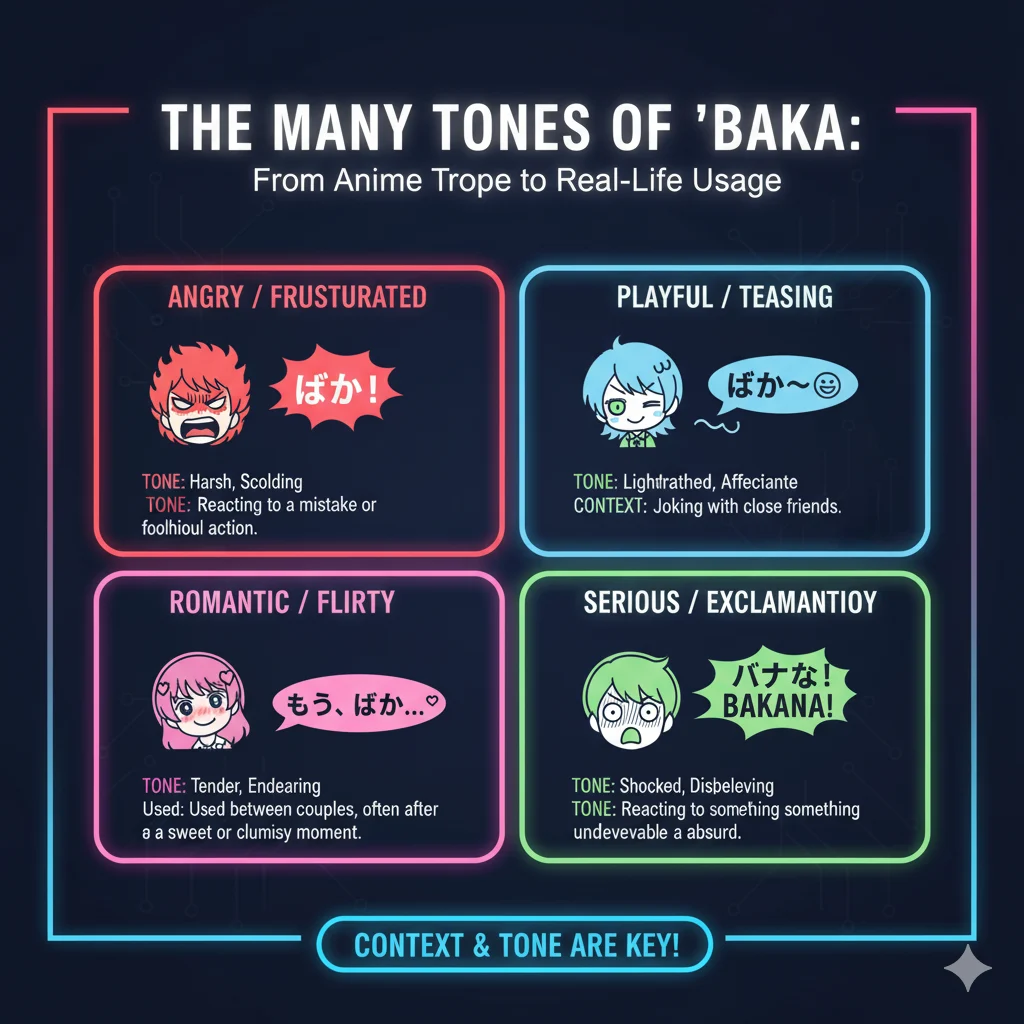
Baka in Anime, Manga, and Pop Culture
If you watch anime, you’ve definitely heard:
- “Baka!”
- “Bakaaa!”
- “Anta baka?” (Are you stupid?)
- “Baka na!” (Impossible!)
- “Bakayaro!” (You idiot bastard!)
Why Anime Characters Say “Baka” So Much
- It’s emotionally expressive
- Fits comedic timing
- Works in dramatic scenes
- Easy for global viewers to recognize
- Connected with tsundere characters
Characters like Asuka (Evangelion), Kagome (Inuyasha), Naruto, and many more use it frequently.
The Tsundere Connection
In anime, the tsundere trope involves:
- A tough, angry exterior
- A soft, loving inside
“Baka!” is their signature line — a way to hide affection while pretending to be annoyed.
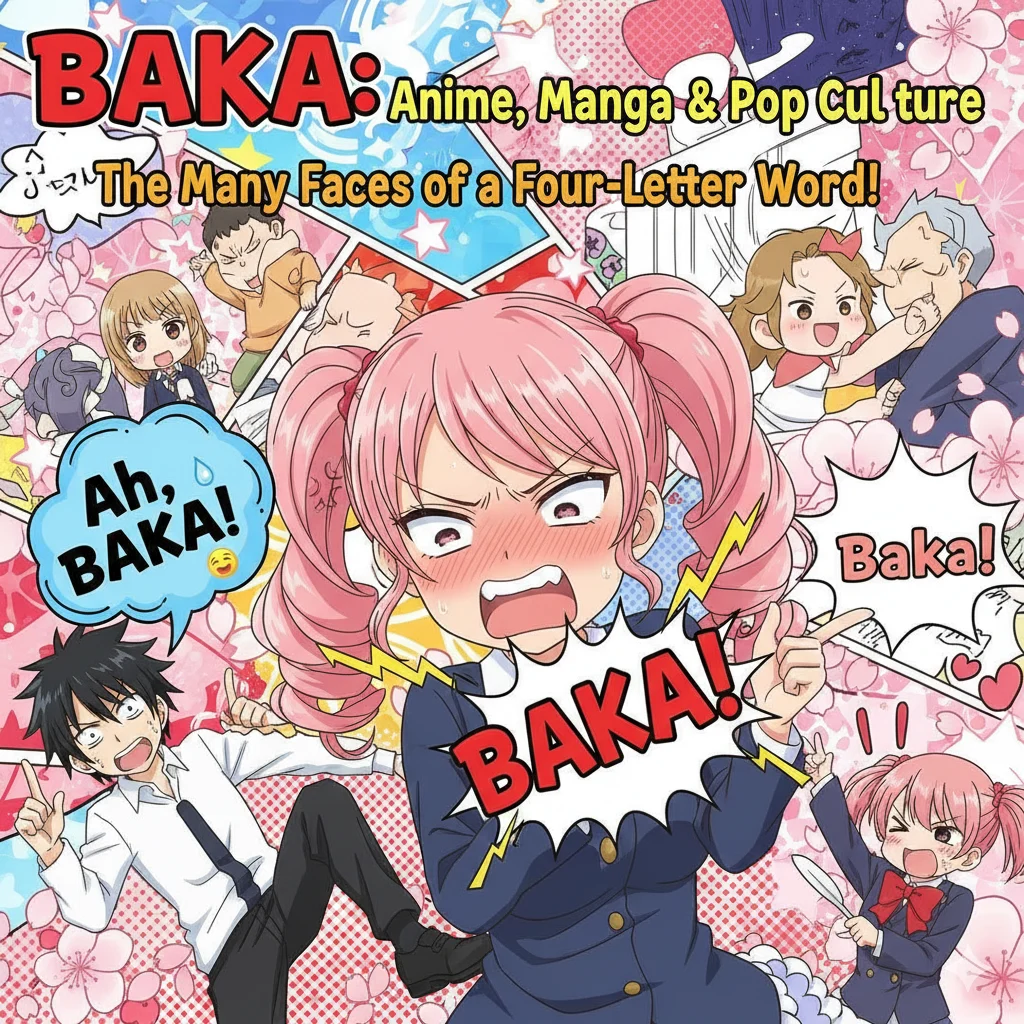
Different Forms and Variations of “Baka”
Japanese often changes a word’s meaning by altering suffixes, tones, or spelling.
Bakana (ばかな / 馬鹿な)
Meaning: “Impossible!”, “No way!”
Used to express shock or disbelief.
Bakayaro (馬鹿野郎)
Meaning: “You freaking idiot!”
Stronger and more aggressive than baka.
Bakabakashii (ばかばかしい)
Meaning: “Ridiculous”, “absurd,” “nonsense.”
Baka mitai (ばかみたい)
Meaning: “I’ve been foolish”
Made famous worldwide by the “Dame Da Ne” karaoke meme.
Kono baka! (このばか)
Meaning: “You idiot!” but can be cute or angry depending on tone.
Soft/affectionate forms
- “Baka ne…”
- “Mou, baka!”
This tone is romantic-shy and common in anime girlfriends/boyfriends.
Cultural Meaning of “Baka” in Japan
Not Always an Insult
Depending on region or tone, baka can feel:
- Playful
- Cute
- Flirty
- Loving
- Friendly teasing
But Can Be Harsh in Serious Moments
In formal settings (workplace, school), calling someone baka can be extremely rude.
Regional Differences
- Kansai region prefers “aho” as the word for “idiot.”
- “Aho” in Kansai is friendlier; “baka” is harsher.
- In Tokyo, “baka” is normal; “aho” feels stronger.
Baka in Online Slang & Global Internet Culture
Outside Japan, baka has become:
- A meme
- A playful insult
- Anime fan slang
- A TikTok & gaming trend
People use it jokingly with friends, similar to:
- “Dummy”
- “Silly”
- “Goofball”
Examples From Internet Culture
- “Stop being a baka 😤”
- “He’s such a baka fr”
- “Baka girl voice” memes
- Cosplayers yelling “bakaaaa!”
Its spread mostly came from anime fans, TikTok edits, kawaii creators, and Japanese meme culture.
Examples of “Baka” in Sentences
Simple, everyday usage
- Baka!
You idiot! - Baka na koto shinaide.
Don’t do foolish things. - Anta baka?
Are you stupid? - Mou, baka…
Oh, you dummy… (cute/romantic)
Longer phrases
- Kare wa baka mitai ni yasashii.
He’s foolishly kind. - Watashi wa baka datta.
I was stupid. - Sono hanashi wa bakabakashii.
That story is ridiculous.
Tone Guide: How Baka Changes in Meaning
Angry Tone
“BAKA!” → serious insult
Embarrassed Tone
“B-baka…” → shy/flirty
Playful/Friendly
“Haha, baka ja nai?” → teasing a friend
Sad/Regretful
“Boku ga baka datta…” → expressing self-hurt or regret
Shock/ disbelief
“Bakana!” → impossible!
Comparison Table: “Baka” vs. Other Japanese Insults
| Word | Meaning | Strength | Common Usage |
|---|---|---|---|
| Baka | Idiot, fool | Medium | Most common, flexible tone |
| Aho | Moron, dummy | Varies by region | Kansai-friendly, Tokyo-rude |
| Bakayaro | You stupid jerk | High | Strong insult |
| Kusogaki | Brat | High | Used for rude kids |
| Yabai | Dangerous/crazy | Low–Medium | Can be positive or negative |
Why “Baka” Became Popular Worldwide
1. Anime’s Global Reach
Shows like Naruto, Dragon Ball, Inuyasha, and My Hero Academia spread the word internationally.
2. Memes & TikTok Audio
The cute or angry “BAKA!” sound became viral in:
- Anime edits
- Tsundere skits
- Cosplay videos
3. Short, Easy, Catchy
One word, easy pronunciation.
4. Kawaii Culture
The cute, bratty anime-girl trope made the word feel charming, not offensive.
5. Gaming & Discord Culture
Gamers tease each other with “baka” during streams and group chats.
When You SHOULD and SHOULD NOT Use “Baka”
You can use it:
- With close friends
- In anime or meme contexts
- For jokes and playful teasing
- When speaking casually
Avoid using it:
- With strangers
- In professional situations
- With elders
- In serious disagreements in Japan
- If you don’t understand the tone
Remember: In Japan, emotional subtlety matters. Saying it too loudly or casually can offend people.
Common Misconceptions About “Baka”
Misconception 1: “Baka always means stupid.”
Reality: It can mean silly, cute, frustrated, shocked, or affectionate.
Misconception 2: “Everyone in Japan uses baka like anime characters.”
Real Japanese speech is more toned-down.
Misconception 3: “Baka is only an insult.”
Not true — it’s often flirty or playful.
Misconception 4: “All anime translations of baka are accurate.”
Sometimes it’s not “idiot” but:
- “Silly”
- “You dummy”
- “You goof”
- “Stop that, you jerk”
FAQs About “Baka”
What does baka actually mean?
Idiot, fool, or stupid person — depending on tone.
Is baka a bad word?
It can be, but it’s also used playfully.
Is baka a swear word?
Not exactly, but it can be insulting if said harshly.
Do Japanese people use baka often?
Yes, but less dramatically than anime.
Why do anime characters say baka so much?
It’s expressive, cute, emotional, and fits tsundere characters.
Is baka romantic?
Sometimes — especially when said softly in a shy voice.
Is baka used in real life like anime?
Not as exaggerated. But the word is common.
Conclusion
“Baka” is one of the most iconic Japanese slang words thanks to anime, memes, and kawaii culture. While it literally translates to “idiot” or “fool,” the emotional range of baka is much deeper. It can be harsh, teasing, romantic, embarrassed, playful, or even affectionate depending on context.
Understanding its tone, cultural background, variations, and usage helps you avoid misunderstandings and appreciate how rich Japanese expressions can be. Whether you hear it in anime or use it jokingly with friends, baka is a word loaded with personality and emotion.

